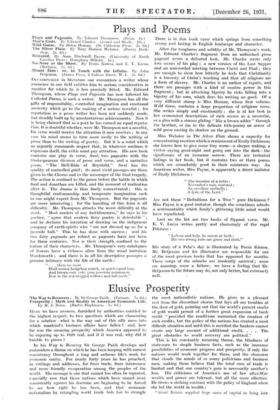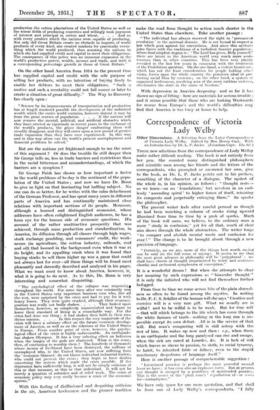Elusive Prosperity
Haim we have answers, furnished by authorities entitled to the highest respect, to two questions which are clamouring for a solution—what is the way out of this silly mess into which mankind's business affairs have fallen ? and, how far was the amazing prosperity which America appeared to be enjoying up to 1929 real, and if it was real, why did it tumble to pieces ?
In his Way to Recovery Sir George Paish develops and embroiders a theme on which he has been harping with earnest consistency throughout a long and arduous life's work for economic sanity. For nearly forty years he has preached, in writings and addresses, for freer trade, freer intercourse and more friendly co-operation among the peoples of the world. His message is one that cannot too often be repeated, especially now that those nations which have sinned most consistently against his doctrine are beginning to be forced to see how right he has been, and that economic nationalism by strangling world trade bids fair to strangle the most nationalistic nations. He gives us a pleasant rest from the discordant chorus that lays all our troubles at the door of gold, pointing out that the world's present stocks of gold would permit of a further great expansion of bank credit " provided the conditions warranted the creation of such credits, but the policy of the nations has created a most difficult situation and until this is rectified the bankers cannot create any large amount of additional credit. . . . The great obstacles to world recovery are political."
This is his constantly recurring theme, the blindness of statesmen to simple business facts, such as the immense possibilities of economic progress and prosperity, if only the nations would work together for them, and the obsession that clouds the minds of so many politicians and business men, making them believe that the total stun of trade is limited and that one country's gain is necessarily another's loss. His criticisms of America's use of her after-War wealth and power are tolerant, but all the more effective. He draws a striking contrast with the policy of England when she led the world in wealth : " Great Britain supplied large sums of capital to bring into production the cotton plantations of the United States as well as the wheat fields of producing countries and willingly took payment of interest and principal in cotton and wheat. . . . And so with every product which the nations were capable of producing. Not only did Great Britain create no obstacle to imports of world products, of every kind, she created marketa for practically every- thing which the world produced, thus assisting the nations to which she had supplied credit and capital to meet their obligations. The consequence of this policy was an immense expansion in the world's productive power, wealth, income and trade, and with it a corresponding percentage growth in those of Great Britain."
On the other hand America from 1914 to the present time has supplied capital. and credit with the sole purpose of selling her products, with no intention of buying freely to enable her debtors to meet their obligations. " Such a motive and such a mentality could not fail sooner or later to create a situation of great difficulty." The Way to Recovery lies clearly open :
" Science by its improvements of transportation and production has at length rendered possible the development of the unlimited wealth which the entire world contains, however distant it may be from the great centres of population. . . . If the nations will now remove the mental, political, and artificial obstacles which they have erected so vigorously in recent years to the exchange of the world's products, the grave danger confronting them will steadily disappear, and they will enter upon a new period of greater trade expansion than they have ever experienced. In this way and in this way alone can the world's present unemployment and financial problems be solved."
But are the nations yet frightened enough to see the sense of this argument ? Or does the trouble lie still deeper than Sir George tells us, less in trade barriers and restrictions than in the racial bitterness and misunderstandings, of which the barriers are a symptom ?
Sir George Paish has shown us how important a factor in the world problems of to-day is the sentiment of the popu- lation of the United States ; and now we have Dr. Bonn to give us light on that fascinating but baffling subject. No one can do so better, for he writes with the calm detachment of the German Professor, and has spent many years in different parts of America and has continually maintained close relations with important sections of its people. Moreover, although a learned and distinguished economist, whose addresses have often enlightened English audiences, he has a keen eye for the human side of economic questions. His account of the rather unattractive prosperity that was achieved, through mass production and standardization, in America, its diffusion through all classes through high wages, stock exchange gambling, and consumers' credit, the weak- nesses (in agriculture, the cotton industry, railroads, coal and oil) that loomed in the background even when it was at its height, and its appalling crash when it was found that buying stocks to sell them higher up was a game that could not always last for ever—all these things will be found most pleasantly and shrewdly described and analysed in his pages. What we want most to know about America, however, is, what it is going to do next. As to this, Dr. Bonn is very interesting and somewhat disquieting.
" The psychological effect of the collapse was stupendol. throughout the world. For some time after one constantly met in the United States very important business men who, like all the rest, were surprised by the crisis and had to pay for it with heavy losses. They were quite crushed, although then• economic position was really not badly shaken. . . . They looked upon themselves, however, as completely impoverished and began to lower their standard of living in a remarkable way. For the crisis had done one thing : it had shaken their faith in their own divine mission. . . . In this respect the very magnitude of the crisis will have a salutary effect on the future economic develop- ment of America, as well as on the relations of the United States to Europe. From another point of view, however, the psycho- logical effect of the crisis is highly unfavourable. An earthquake has shaken Olympus. It has a very sobering effect on believers when the images of the gods are shattered. What is the sense, then, of continuing to worship them ? The hundreds of thousands whose means of livelihood have been destroyed, the millions of unemployed who, in the United States, are now suffering from the economic blizzard,' do not blame individual industrial leaders, who could not prevent the crisis ; they begin to have doubts concerning the system which made the crisis possible. If the depression lasts sufficiently long, it will not be simply criticism of this or that measure, or this or that individual. It will not bo merely a question of subsidies and of relief work. The crisis of economic policy may very easily become a crisis of the economic system."
With this feeling of disillusioned and despairing criticism in the air, American lawlessness and the pioneer tradition make the road from thought to action much shorter in the United States than elsewhere. Take another passage : " The individual has always reserved the right to ' permanent revolution ' in the spiritual domain. He is not bound to respect a law which goes against his convictions. And since this attitudo joins forces with the traditions of a turbulent frontier population. whose final simplest dogma is : The Lord has given, Help yourself,' there are latent in the American world very much more acute tensions than in other countries. This has been very plainly revealed in the last few years in connexion with the treatment of the Prohibition question. On the one hand, a violent fanaticism, which has not the least consideration for people holding other views, forces upon the whole country the primitive ideal of pro- moting social bliss by coercion ; on the other hand, a system of organized lawlessness, involving acts of the most ruthless violence, checkmates the state in the name of freedom."
With depression in America deepening— and so far it has shown no sign of lifting—here arc materials for serious trouble ; and it seems possible that those who are looking Westwards for rescue from Europe's and the world's difficulties may find that America is too busy at home to help.

































 Previous page
Previous page